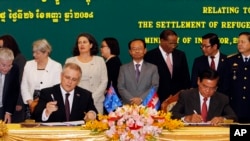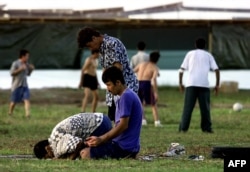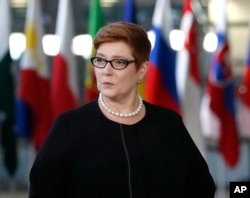Australia’s controversial refugee resettlement deal with Cambodia has expired and is “no longer an option” for the immediate future, the country’s Senate has been told.
Senator Richard Di Natale, the leader of the Australian Greens, pressed the Department of Foreign Affairs and Trade (DFAT) on the future of the agreement in a Senate Estimates Hearing last week, transcripts of which were released Thursday.
“Senator, the MOU expired on the 26th of September so it’s no longer an option for refugees on Nauru to resettle into Cambodia,” DFAT’s people smuggling and human trafficking Ambassador Geoffrey Shaw told the committee.
In 2014, then Immigration Minister Scott Morrison infamously clinked champagne glasses with Cambodian officials to celebrate the resettlement deal.
It cost Australia tens of millions of dollars in aid but only ever saw a handful of refugees arrive in Cambodia and even less stay.
The Australian government was berated by rights groups for paying, what critics call, a corrupt and authoritarian government to take refugees it had forced into an offshore processing center on the tiny island nation of Nauru.
Pressed on any potential future extension on the deal, Shaw said he had provided the government policy advice on the issue but refused to disclose what that had been..
Ket Sophann, spokesman for the Cambodian Ministry of Foreign Affairs, told VOA Thursday that the refugee deal remains valid, but it’s not attractive to the refugees.
“There is no plan to end this deal, meaning the project is still going on. But nobody wants to come,” he said, noting that the governments of the two countries have not yet decided to end the deal.
General Khieu Sopheak, spokesman for the Ministry of Interior, said Phnom Penh will find a way to discuss the issue with the Australian government if it intends to end the deal.
“If they want to end the deal, we will probably discuss it once again or end it with a written notification. We will discuss in a legal way, which is applicable for us,” he said.
Hong Lim, a Cambodian-Australian parliamentarian in the Victorian State of Australia who has been a vocal critic of the deal and Hun Sen’s regime, welcomed its end.
“Well it should be [ended], it became ridiculous and an albatross for Australia,” he said.
“Hopefully everyone is aware it is not working, the [AUD] $55 million is just a waste and a disgrace and everyone now does the right thing for Cambodia,” he said.
Carl Thayer, an emeritus professor and Cambodia expert at The University of New South Wales, said the deal was a bad one for the refugees.
“The security and safety of these people, their status as residents of Cambodia, was never determined. And there’s no interest in the government of Cambodia going out of its way to protect them, to give them residency or a path to citizenship.”
With political pressure in Australia mounting on the government to stop detaining children on Nauru and the Cambodian government’s recent move to even greater authoritarianism, he suggested a resuscitation was very unlikely.
The party of Hun Sen, who has ruled Cambodia for more than 33 years, won every National Assembly seat in a widely discredited election in July after banning the only viable opposition party and jailing its leader.
In the lead up to that ballot, Hun Sen threatened to beat any protesters in Australia shortly before a trip to Sydney. His government’s recent activities on Australian shores also came under the microscope during the Senate hearing.
Foreign Minister Marise Payne told senators her staff had alerted relevant agencies to death threats Cambodian ruling party agents had allegedly made against the country’s diaspora community.
“We are concerned about suggestions that individuals may be threatened in Australia," Payne said.
“That’s why we’ve made representations to the Cambodian government and it’s why we have forwarded those threats to a number of appropriate authorities in Australia. We don’t condone those activities and we take those allegations very seriously.”
In September, the Australian Broadcasting Corporation reported on a campaign led by Cambodian Prime Minister Hun Sen’s eldest son Hun Manet to exert influence in Australia by recruiting a force of exchange students.
Four senior members of Australia’s Cambodian community had received death threats, it reported.
Sok Eysan, spokesman for the ruling Cambodian People’s Party (CPP), denied the allegations about death threats made by the CPP agents. He said it was a fake news fabricated by the opposition party to spoil the reputation of the CPP.
“I think that this information is a fake information which (was) invented by the opposition groups,” he said.
In June, the Australian parliament passed sweeping new foreign influence laws that targeted a raft of spying activities and introduced a register for individuals or entities undertaking activities on behalf of foreign principals.
Professor Thayer said Cambodia could inadvertently become an early target of that legislation.
Hul Reaksmey reported from Phnom Penh.






